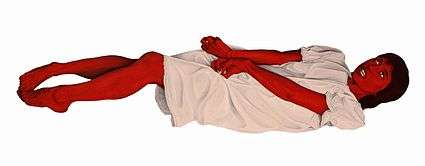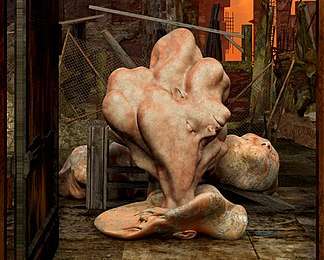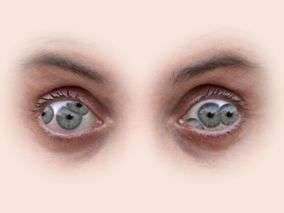Marina Núñez
Marina Núñez (born 1966) is a Spanish artist, and a professor at the University of Vigo.[1]
Marina Núñez | |
|---|---|
%22%2C_2006.jpg) | |
| Born | 1966 (age 53–54) Palencia, Spain |
| Nationality | Spanish |
| Alma mater | University of Salamanca University of Castilla-La Mancha |
| Known for | Artist, professor and writer |
| Website | marinanunez |
Her work is included in the collections of Museo Nacional Centro de Arte Reina Sofía in Madrid, Artium in Vitoria, MUSAC in Leon, Patio Herreriano in Valladolid, TEA in Tenerife, Fundación La Caixa, Fundación Botín, Corcoran Gallery of Art in Washington, DC, National Museum of Women in the Arts in Washington DC, Mint Museum of Art in Charlotte, North Carolina, Katzen Arts Center, American University Museum, in Washington DC, Fonds régional d'art contemporain in Corsica, France.[2]
Education
Núñez has a bachelor of fine arts degree from the University of Salamanca, and a PhD in fine arts from the University of Castilla-La Mancha.[3]
Career and work

Her work was first exhibited in the early 1990s. Her depictions of madwomen.[4] and female monsters revealed an interest in gender discourses -in deconstructions and propositions about women's identities, in the wake of what was one of the great discursive achievements of feminism of the 60th-70th and later.
Her oil painting, narrative and conceptual, progressively combined, from the first decade of 2000, with digital techniques in 2D and 3D, both still image and video.[5] Simultaneously, new iconographies, related to the territory of science fiction and horror -without leaving behind references of the clinical imaginary and influences of certain moments in Art History as the Baroque or Surrealism- were consolidated in her images[6]
Marina Núñez represents posthuman identities through images of mutant, mestizo, multiple bodies. In philosopher José Jimenez´s words, "the question of identity opens to the experience of metamorphosis: I am myself and my other. Body and image. Male and female. Rational and insane. Normal and monster. Native and foreign. Human being and machine. Earthling and alien."[7]
Selected exhibitions

Solo
She has exhibited individually in significant public institutions such as: Museo Nacional Centro de Arte Reina Sofía in Madrid (1997),[8] La Gallera in Valencia (1998),[6] Pilar and Joan Miró Foundation in Mallorca (2000), Veronicas Church in Murcia (2001), DA2 in Salamanca (2002),[9] Casa de America in Madrid (2004), Cervantes Institute in Paris (2006), La Panera in Lleida (2008), MUSAC in León (2009),[10] Centre del Carme in Valencia (2010),[11] Sala Rekalde in Bilbao (2011),[12] Patio Herreriano in Valladolid (2012),[13] Sala Alcalá 31 in Madrid (2015),[14][15] or Artium in Vitoria (2016),[16][17] Es Baluard in Palma, Majorca (2017),[18] or Barjola Museum in Gijón (2017).[3][19]

References
- "Marina Núñez Jiménez". University of Vigo. Retrieved 1 October 2017.
- "Marina Núñez pone el foco en los artistas del futuro". ABC (newspaper) (in Spanish). 7 November 2016. Retrieved 19 September 2017.
- "La artista palentina Marina Núñez prepara una obra para la capilla del Barjola". La Nueva España. Retrieved 19 September 2017.
- Mayayo, Patricia (11 May 2007). "Charcot reinterpretado" (PDF). Jano Medicina y Humanidades. 1.651: 52–54. Archived from the original (PDF) on 9 April 2015. Retrieved 19 September 2017.
- "Marina Núñez: "El arte cambia el mundo, a la fuerza, estoy convencida"". Soy de letras (in Spanish). 27 October 2016. Retrieved 19 September 2017.
- Tejeda, Isabel (2011). "Marina Núñez o la construcción del cíborg. Un discurso multimedia entre la utopía y la distopía". Icono 14. Nº 18, año 9, Vol. 1-Mujeres y tecnología: 1–19.
- Jiménez, José (8 April 2000). "Alien". El Mundo.
- "La 'locura' de Marina Núñez abre un espacio en el Reina Sofía". El País (in Spanish). 18 September 1997. Retrieved 1 October 2017.
- Francia, Ignacio (23 April 2002). "El Centro de Arte de Salamanca marca una línea contemporánea e internacional". El País (in Spanish). Retrieved 1 October 2017.
- Jarque, Fietta (24 January 2009). "Entrevista | Identidad del mutante". El País (in Spanish). Retrieved 1 October 2017.
- "Arte en el último refugio". El Mundo. Retrieved 19 September 2017.
- "Los mutantes de Marina Núñez toman la Sala Rekalde. El Correo". El Correo. Retrieved 19 September 2017.
- impresa, Edición. "Marina Núñez, en el infierno". El Cultural. Retrieved 1 October 2017.
- Guardiola, Javier D. (23 December 2015). "Marina Núñez: "Los guiones de la ciencia-ficción me resultan retrógrados"". ABC (newspaper) (in Spanish). Retrieved 19 September 2017.
- Blas, Susana (8 January 2016). "El infierno son nosotros. Una conversación con Marina Núñez". Masdearte (in Spanish). Retrieved 19 September 2017.
- "El Artium acoge 38 obras de la artista Marina Núñez en El fuego de la visión". El Mundo (in Spanish). Retrieved 19 September 2017.
- Cobo, Isabel (2 June 2016). "Artium abre sus puertas a "la visión" de la artista Marina Núñez". Cadena SER (in Spanish). Retrieved 19 September 2017.
- Garcia, Miquel. "Marina Núñez omple de fantasmes l'Aljub d'Es Baluard" (in Catalan). IB3. Retrieved 1 October 2017.
- "El universo de Marina Núñez se instala en el Museo Barjola". El Comercio (in Spanish). 15 September 2017. Retrieved 19 September 2017.